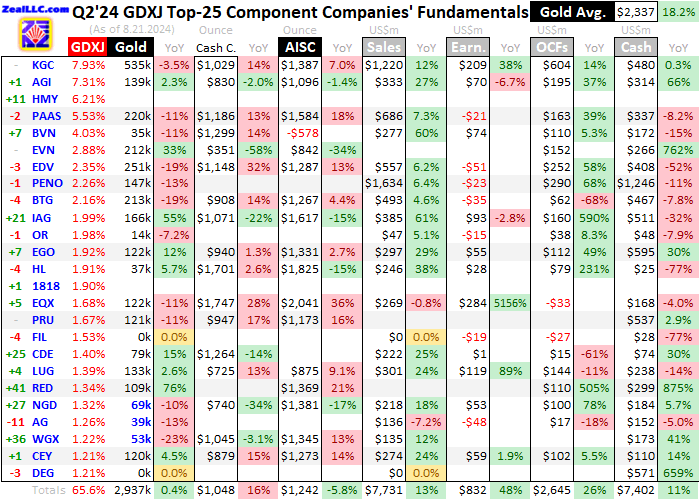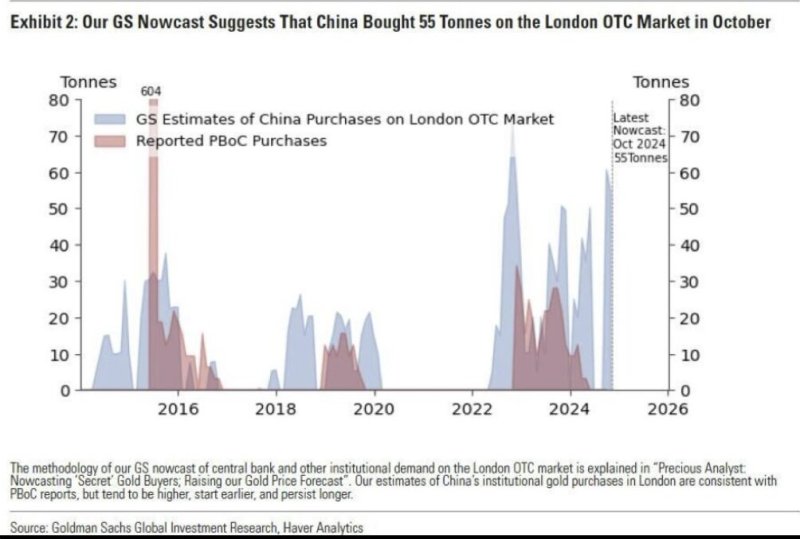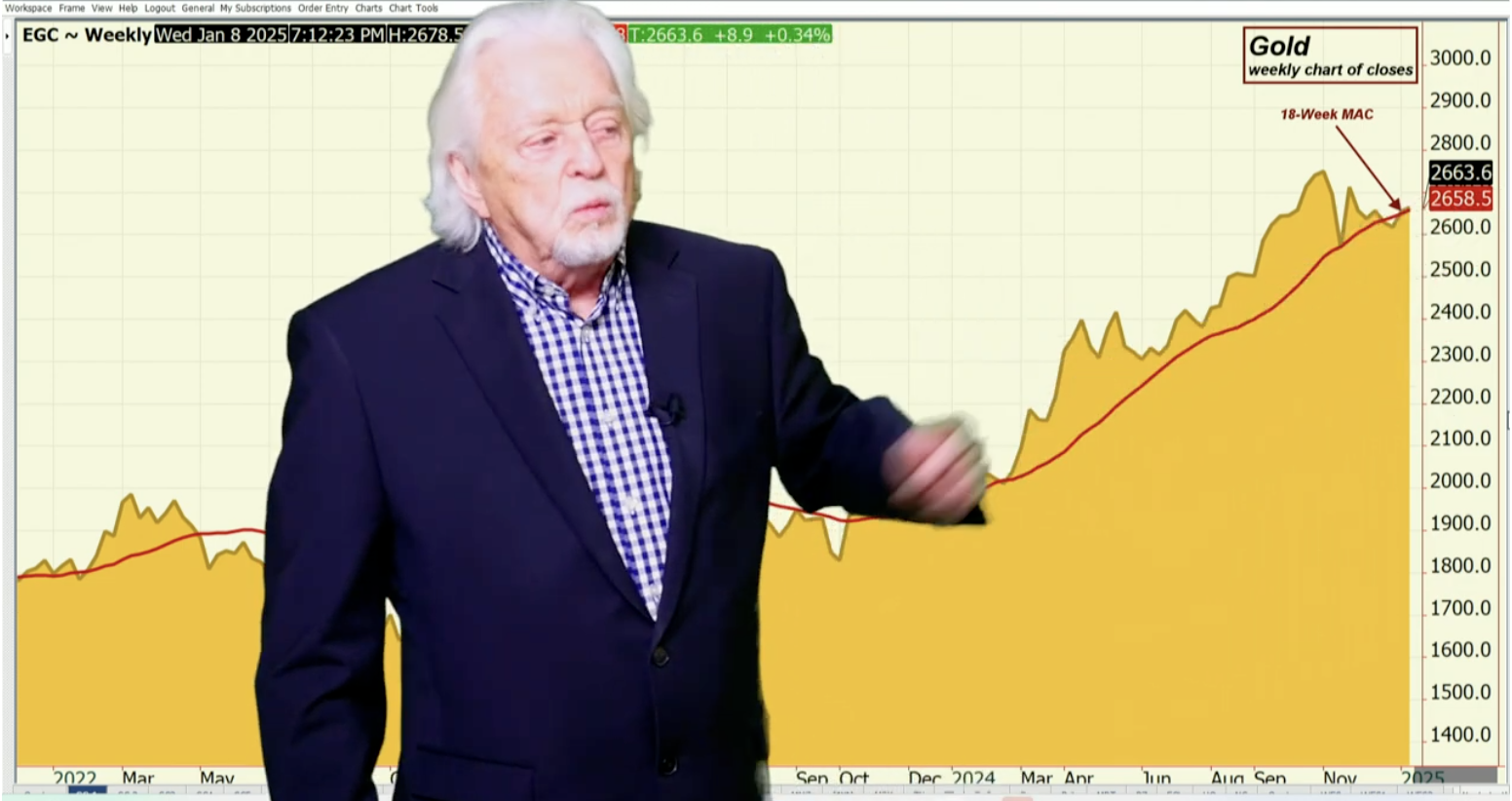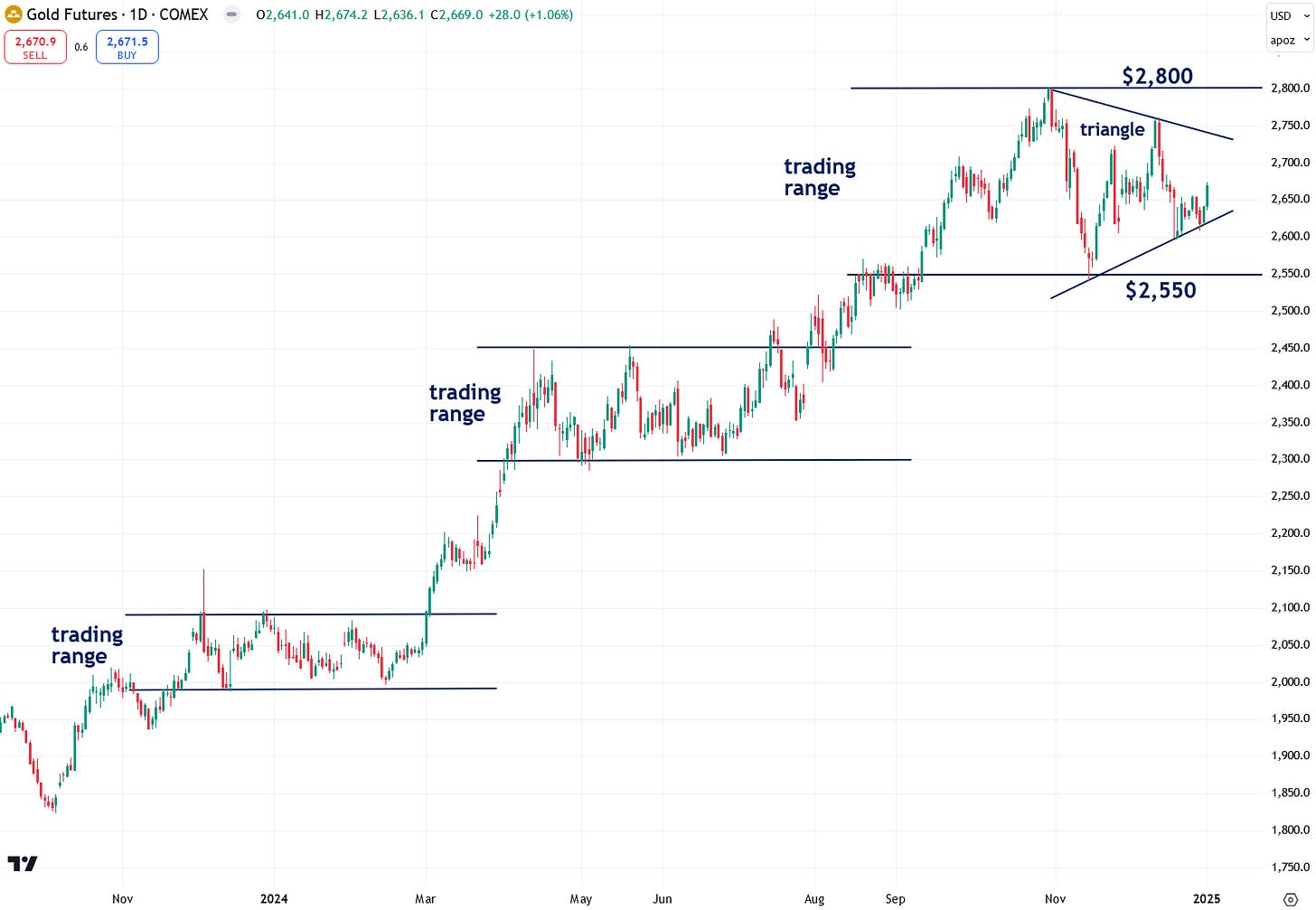The mid-tier and junior gold miners in this sector’s sweet spot for upside potential just finished reporting truly-spectacular quarterly results. Fueled by dazzling record gold prices and lower mining costs, smaller gold miners’ unit earnings skyrocketed to their highest levels ever. Those incredibly-rich profits have left mid-tiers even more undervalued relative to prevailing gold prices, portending massive catch-up rallying.
The leading mid-tier-gold-stock benchmark is the GDXJ VanEck Junior Gold Miners ETF. With $5.5b in net assets mid-week, it remains the second-largest gold-stock ETF after its big brother GDX. That is dominated by far-larger major gold miners, though there is much overlap between these ETFs’ holdings. Still misleadingly named, GDXJ is overwhelmingly a mid-tier gold-stock ETF with juniors having little weighting.
Gold-stock tiers are defined by miners’ annual production rates in ounces of gold. Small juniors have little sub-300k outputs, medium mid-tiers run 300k to 1,000k, large majors yield over 1,000k, and huge super-majors operate at vast scales exceeding 2,000k. Translated into quarterly terms, these thresholds shake out under 75k, 75k to 250k, 250k+, and 500k+. Today only three of GDXJ’s 25 biggest holdings are true juniors!
Their Q2 outputs are highlighted in blue in the table below. Juniors not only mine less than 75k ounces per quarter, but their gold output generates over half their quarterly revenues. That excludes streaming and royalty companies that purchase future gold output for big upfront payments used to finance mine-builds, and primary silver miners producing byproduct gold. But mid-tiers often make better investments than juniors.
These gold miners dominating GDXJ offer a unique mix of sizable diversified production, excellent output-growth potential, and smaller market capitalizations ideal for outsized gains. Mid-tiers are less risky than juniors, while amplifying gold uplegs more than majors. So we’ve long specialized in the fundamentally-superior mid-tiers and juniors at Zeal, actively trading these smaller gold miners for a quarter-century now.
All 1,510 newsletter stock trades realized as of Q2’24 averaged +15.6% annualized gains, about double the long-term stock-market average! And that’s heading higher, after early August’s Japanic fear spike stopped out more trades with big realized gains. We’ve been refilling our newsletter trading books since, as gold-stock prices remain way too low relative to their phenomenal fundamentals at lofty prevailing gold levels.
GDXJ’s latest upleg has powered 59.2% higher at best over 9.4 months into mid-July. That’s still modest by historical precedent, and smaller gold miners’ gains really accelerate later in gold uplegs. The longer and higher gold climbs, the more bullish sentiment that fuels which attracts back traders to chase big gold-stock gains. Eventually a psychological tipping point is reached and that buying becomes self-feeding.
For 33 quarters in a row now, I’ve painstakingly analyzed the latest operational and financial results from GDXJ’s 25-largest component stocks. Mostly mid-tiers, they now account for 65.6% of this ETF’s total weighting. While digging through quarterlies is a ton of work, understanding smaller gold miners’ latest fundamentals really cuts through the obscuring sentiment fogs shrouding this sector. This research is essential.
This table summarizes the GDXJ top 25’s operational and financial highlights during Q2’24. These gold miners’ stock symbols aren’t all US listings, and are preceded by their rankings changes within GDXJ over this past year. The shuffling in their ETF weightings reflects shifting market caps, which reveal both outperformers and underperformers since Q2’23. Those symbols are followed by their recent GDXJ weightings.
Next comes these gold miners’ Q2’24 production in ounces, along with their year-over-year changes from the comparable Q2’23. Output is the lifeblood of this industry, with investors generally prizing production growth above everything else. After are the costs of wresting that gold from the bowels of the earth in per-ounce terms, both cash costs and all-in sustaining costs. The latter help illuminate miners’ profitability.
That’s followed by a bunch of hard accounting data reported to securities regulators, quarterly revenues, earnings, operating cash flows, and resulting cash treasuries. Blank data fields mean companies hadn’t disclosed that particular data as of the middle of this week. The annual changes aren’t included if they would be misleading, like comparing negative numbers or data shifting from positive to negative or vice-versa.
Weeks before Q2 earnings season even began, I predicted last quarter would prove gold miners’ most-profitable ever in a late-June essay on “Gold Miners’ Record Quarter”. But despite my high expectations, the smaller gold miners’ epic Q2 performances exceeded them! This still-mostly-unloved sector is firing on all cylinders. Yet the vast majority of traders remain unaware, leaving massive room to chase this bull.
The GDXJ top 25 experienced some major composition changes over the past year, with five smaller gold miners rocketing up into these elite ranks. All are mid-tier and junior producers, which usually have way-better fundamentals than streamers, royalty companies, and explorers. So GDXJ is becoming purer as traders bid better producers’ stocks much higher, increasing this ETF’s upside leverage to higher gold prices.
These GDXJ-top-25 stocks are mostly an expanded subset of the GDX-top-25 majors. I analyzed their new Q2 results in last week’s essay, which were also awesome yet still not as impressive as GDXJ’s. These GDXJ-top-25 stocks representing 65.6% of this ETF are also collectively weighted at 25.3% in GDX. GDXJ effectively lops off GDX’s nine largest holdings, which are mostly deadweight super-majors.
Those gigantic gold miners perpetually struggle to overcome depletion at the vast scales they operate. So their output generally shrinks, except for four quarters after expensive acquisitions. Their extensive stables of mines also tend to have higher costs, making for lower profitability. And because of far-larger market capitalizations, super-majors’ stocks are much harder to bid higher during major gold uplegs.
Production growth trumps everything else as the primary mission for gold miners. Higher outputs boost operating cash flows which help fund mine expansions, builds, and purchases, fueling virtuous circles of growth. Mining more gold also boosts profitability, lowering unit costs by spreading big fixed operational expenses across more ounces. The GDXJ top 25 eked out 0.4%-YoY output growth to 2,937k ounces in Q2.
While small, that extended mid-tiers’ production-growth streak to eight of the last nine quarters! That’s quite impressive, especially compared to the GDX majors’ overall output sliding lower for six quarters in a row now. The big composition changes in GDXJ’s upper ranks didn’t affect that comparison much. Also in the comparable Q2’23, South Africa’s Harmony Gold and China’s Zhaojin Mining hadn’t reported results yet.
And the same two non-producing explorers were also among the GDXJ top 25 a year ago, Canada’s Filo Corp. and Australia’s De Grey Mining. Both are advancing major gold deposits still years from mine-builds. DEG’s definitive feasibility study for its Australian project estimated annual production averaging a huge 530k ounces! And that gold would be super-profitable to mine with AISCs forecast down near $850 per ounce.
The standout GDXJ-top-25 performer last quarter was IAMGOLD, which achieved fantastic 55.1%-YoY production growth! IAG is ramping up a brand-new gold mine projected to yield 347k ounces each year for the first six of a long 18-year mining life. That will grow this mid-tier’s overall production by about 3/4ths, while seriously boosting corporate earnings with life-of-mine AISCs expected to average just $854.
This mine just went commercial in early August, after Q2. Yet IAMGOLD’s Q2 results still proved so darned impressive its stock soared 16.3% higher the day after they were reported! That output surge helped drive AISCs 15.4% lower since Q2’23. Unusually so late in a year, IAG also upped 2024 production guidance at its two other mines by 12.5% at the midpoint, while slashing their projected AISCs by 5.2%.
IAG stock is wildly outperforming even GDXJ, skyrocketing 160.9% higher at best since early October! Yet this growing mid-tier remains cheap fundamentally, trading at a 21.6x trailing-twelve-month price-to-earnings ratio which is low for gold stocks. We’ve traded IAG a bunch of times over the years, and first recommended it as a long-term investment at $1.52 per share. This good stock closed at $5.27 mid-week.
There are plenty of other great growth stories among mid-tiers and juniors. We’ve always prioritized high-potential smaller gold miners with new expansions and mine-builds soon going live for our newsletter trades. These tend to surprise most traders, since it takes so much expertise and time to stay abreast of many dozens of gold stocks. Finding such opportunities before the rest of the herd is incredibly valuable.
Another thriving mid-tier we’ve long traded and invested in is Eldorado Gold. EGO’s production grew a good 11.8% YoY in Q2, and this company reiterated its 2024 midpoint guidance of mining 530k ounces. That is nice growth from 2023’s 485k, and Eldorado has already forecast midpoint outputs of 570k in 2025, 663k in 2026, and 705k in 2027! EGO stock has soared 113.8% in this upleg, yet still trades at a 20.0x P/E.
Great mid-tier and junior growth plays like these are discussed often in our newsletters, enabling our subscribers paying the bills supporting these essays to buy in earlier and lower. With such amazing opportunities and huge gains among smaller gold miners, why bother with the deadweight-retarded GDX ETF at all? And even the GDXJ top 25 is saddled with plenty of stocks that chronically underperform.
Unit gold-mining costs are generally inversely proportional to gold-production levels. That’s because gold mines’ total operating costs are largely fixed during pre-construction planning stages, when designed throughputs are determined for plants processing gold-bearing ores. Their nameplate capacities don’t change quarter to quarter, requiring similar levels of infrastructure, equipment, and employees to keep running.
So the only real variable driving quarterly gold production is the ore grades fed into these plants. Those vary widely even within individual gold deposits. Richer ores yield more ounces to spread mining’s big fixed expenses across, lowering unit costs and boosting profitability. But while fixed costs are the lion’s share of gold mining, there are also sizable variable costs. That’s where recent years’ raging inflation hit hard.
Cash costs are the classic measure of gold-mining costs, including all cash expenses necessary to mine each ounce of gold. But they are misleading as a true cost measure, excluding the big capital needed to explore for gold deposits and build mines. So cash costs are best viewed as survivability acid-test levels for the major gold miners. They illuminate the minimum gold prices necessary to keep the mines running.
In Q2’24 the GDXJ top 25’s average cash costs soared 16.2% YoY to $1,048 per ounce, the highest on record! But that remains far below prevailing gold prices, so it isn’t concerning. That was also dragged higher by an extreme outlier, Equinox Gold’s $1,747. This mid-tier faced unusual challenges last quarter, mainly transitioning one of its eight mines to a new pit deposit after “geotechnical issues” in a depleting one.
All-in sustaining costs are far superior than cash costs, and were introduced by the World Gold Council in June 2013. They add on to cash costs everything else that is necessary to maintain and replenish gold-mining operations at current output tempos. AISCs give a much-better understanding of what it really costs to maintain gold mines as ongoing concerns, and reveal the mid-tier gold miners’ true operating profitability.
The GDXJ top 25’s average AISCs last quarter amazingly fell 5.8% YoY to just $1,242 per ounce! That proved their fifth consecutive quarter of sizable-to-big annual declines, to their lowest levels since Q1’22! As I’ll analyze shortly, such low costs naturally fueled fantastic profits. But unfortunately those average AISCs were skewed much lower by another extreme outlier, this time to the downside which is quite unusual.
Astoundingly Peru’s Buenaventura reported deeply-negative AISCs last quarter of -$578 per ounce! This sorcery is only possible because of big silver, copper, zinc, and lead byproducts. Just 30% of BVN’s Q2 revenues came from gold, but like plenty of poly-metallic miners it chooses to report in gold-centric terms. That’s a shrewd decision, as gold stocks command higher interest and earnings multiples than base-metals miners.
Buenaventura has a big revamped silver-zinc-lead mine ramping back up. While BVN’s gold production fell 10.9% YoY last quarter, silver, zinc, and lead output skyrocketed 175.2%, 82.0%, and 134.8%! And in Q2 that mine was only operating at 80% capacity, and is expected to ramp to 100% by year-end. So this company could report super-low gold AISCs due to byproduct credits for years to come, dragging down averages.
As BVN had long languished as a super-high-cost gold miner, it is tempting to exclude its negative AISCs. Without them, the rest of the GDXJ top 25 averaged a much-higher $1,356 in Q2. That would have risen a modest 2.8% YoY, still good. Yet EQX was an opposing high-cost outlier at $2,041 last quarter, and without it or BVN the rest of these elite mid-tiers were running $1,310 AISCs which slipped 0.7% YoY.
For the great majority of the last 33 quarters, the GDXJ top 25’s average AISCs were skewed higher by a handful of extreme outliers. While I pointed that out in every results essay, I always still used the actual averages including outliers to calculate implied sector unit profits. BVN was often one of those super-high-AISC ones, and for consistency its super-low negative AISCs now also have to be included in this analysis.
Gold powered up to 11 new nominal record closes in Q2’24, helping catapult last quarter’s average price up 18.2% since Q2’23 to a dazzling record $2,337! That trounced all previous highwater marks including Q1’24’s $2,072 and Q2’23’s $1,978. Subtract last quarter’s GDXJ-top-25 average AISCs of $1,242 from that, and mid-tiers and juniors earned crazy record unit profits of $1,095 per ounce! That is off-the-charts high.
The previous record unit earnings were $928 way back in Q3’20, when both gold prices and AISCs were much lower. Professional fund investors love earnings growth, and the GDXJ top 25’s unit profits last quarter soared 66.2% YoY. And that’s just the latest in a magnificent five-quarter streak unparalleled in all the stock markets, where sector unit profits skyrocketed 33.8%, 106.4%, 125.7%, 62.6%, and 66.2% YoY!
No wonder plenty of fundamentally-superior smaller gold miners’ stocks have already more than doubled in this upleg, and will likely at least double again before it gives up its ghost. With broader-stock-market earnings likely to come under increasing pressure as Americans struggle with raging inflation, gold stocks are a shiny bastion of epic profits growth. And that remains on track to persist during coming quarters.
Over halfway through Q3 now, gold has already averaged $2,419 on close this quarter! That is likely to climb further before quarter-end too, with gold now trading around $2,500. Combining with even-higher gold prices are plenty of GDXJ-top-25 miners forecasting better production and lower costs in the back half of 2024 compared to its first half. I found plenty of examples of that wading through the latest quarterlies.
Another one of our fast-growing smaller-gold-stock trades and investments is New Gold. From early October to mid-week, NGD stock has skyrocketed a phenomenal 202.2% higher! Yes, that’s already a triple in still-immature gold and gold-stock uplegs. In its Q2 quarterly NGD declared “production set to increase and all-in sustaining costs set to decrease in the second half of the year”, detailing all the reasons.
GDXJ-top-25 average AISCs also have a solid chance of forging lower again in Q3’24. But conservatively let’s assume gold averages just $2,400 and AISCs surge back up to $1,300. That still would make for huge record GDXJ-top-25 unit profits of $1,100, which would soar another 65% YoY! As more investors finally realize how fast and huge gold-mining earnings are growing, they will flood back in to chase this sector.
These elite mid-tiers’ hard accounting results under Generally Accepted Accounting Principles or other countries’ equivalents were also quite strong in Q2 despite GDXJ-top-25 composition changes. Overall revenues surged 13.2% YoY to $7,731m. But that’s not a record because major Harmony Gold hasn’t reported yet. Its fiscal years end in Q2s, so Q2 and full-year results are released later than other quarters’.
Bottom-line accounting profits soared 48.2% YoY to $832m collectively across the GDXJ top 25. But as always in this sector, there were plenty of large unusual items flushed through some income statements in Q2’24 and the comparable Q2’23. The biggest by far was Equinox Gold recognizing a $470m gain on its previous 60% stake in its big mine-build, when EQX bought the remaining 40% from a joint-venture company!
But estimating adjusted earnings last quarter is more muddled than usual. Several of the GDXJ top 25 reported big deferred income taxes, which weren’t separated from normal quarterly income taxes. So after spending too much time trying to understand all the income-statement notes explaining these latest unusual items, they still aren’t clear enough. So I can’t reliably estimate overall Q2’24 adjusted earnings.
These elite mid-tiers’ and juniors’ cash flows generated from operations climbed 26.3% YoY to $2,645m, while their cash treasuries surged 10.7% to $7,402m. Both are on the higher sides of their ranges during the last 33 quarters. The GDXJ top 25 are earning and holding plenty of cash to continue financing their all-important expansions and mine-builds, which are necessary to continue growing production on balance.
With gold achieving new records, gold miners earning money hand over fist, yet gold stocks remaining seriously undervalued relative to prevailing gold levels, this sector’s setup remains exceptionally-bullish. Sooner or later gold-stock sentiment will reach a tipping point where speculators and investors alike rush to chase their mounting gains. Before gold stocks blast higher again, you need to get informed and get deployed.
Successful trading demands always staying informed on markets, to understand opportunities as they arise. We can help! For decades we’ve published popular weekly and monthly newsletters focused on contrarian speculation and investment. They draw on my vast experience, knowledge, wisdom, and ongoing research to explain what’s going on in the markets, why, and how to trade them with specific stocks.
Our holistic integrated contrarian approach has proven very successful, and you can reap the benefits for only $10 an issue. We extensively research gold and silver miners to find cheap fundamentally-superior mid-tiers and juniors with outsized upside potential. Sign up for free e-mail notifications when we publish new content. Even better, subscribe today to our acclaimed newsletters and start growing smarter and richer!
The bottom line is the mid-tier and junior gold miners just reported truly-spectacular quarterly results. As they continued collectively growing production, record gold prices fueled its highest quarterly average ever by far. Such lofty gold levels combined with lower average mining costs made for massive record unit earnings, forcing long-battered gold-stock valuations relative to gold even lower. That’s all super-bullish.
And with gold forging higher still and plenty of gold miners forecasting lower costs in coming quarters, gold-stock profits are heading even higher. Such rich and fat earnings should increasingly attract fund investors to this sector, driving gold-stock prices much higher. Traders need to do their homework and get deployed before this sector reaches its psychological tipping point, when chasing spawns big popular buying.
Adam Hamilton, CPA
August 23, 2024
Copyright 2000 – 2024 Zeal LLC (www.ZealLLC.com)
Read the full article here












Leave a Reply